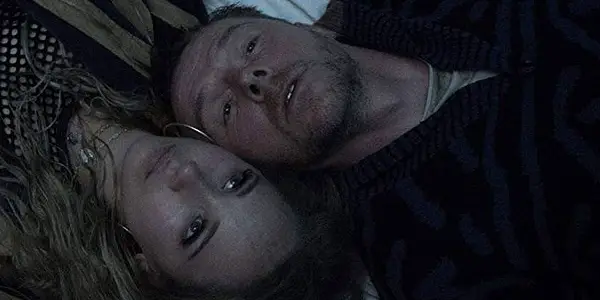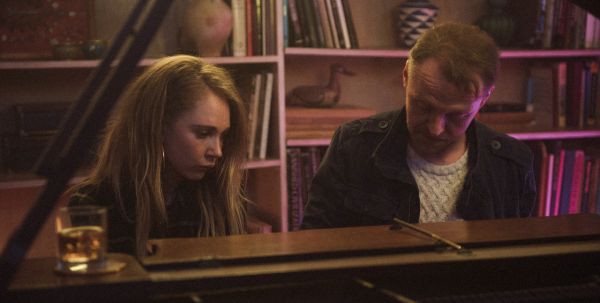LOST TRANSMISSIONS: Bad Connections

Former film student from Scotland turned writer and film reviewer.
There was a time in movies when mental illness was viewed with an offbeat, counterculture quirkiness; characters who deviated from the norm of society or of acceptable social conventions were ‘eccentric’ at worst, and Hollywood all but glanced over the fact that these quirky, funny people might actually be struggling with something serious. Fortunately, we’ve seen a turnaround in this pattern over the last decade, from Homeland to Silver Linings Playbook. Mental illness, more and more, is treated with the seriousness that it deserves.
Katharine O’Brien‘s feature debut, Lost Transmissions, falls squarely into this category. Based on a true story concerning a friend of O’Brien‘s, Lost Transmissions is the story of Hannah (Juno Temple), an aspiring singer/songwriter, and Theo (Simon Pegg), a vibrant expat music producer struggling with schizophrenia. Theo’s decline began with a psychotic break he had while dropping acid with his bandmates decades back. He has it under control now, but only when he takes his medication – unfortunately Theo has taken a rather dim view of pharmaceutical interventions and regularly ditches the medication which helps him function in society.
While other films of a similar mould (such as the aforementioned Silver Linings Playbook) would concentrate on a ‘will they, won’t they’ dynamic between Hannah and Theo, O’Brien steers away from this particular convention. Lost Transmissions, it should be noted, is not a love story. There is no question of a romantic love providing the salvation for the adrift Theo, or the quietly desperate Hannah.

Neither is Theo’s condition treated with the sentimental blush you might expect of a more romance-oriented story. His journey is a stark one, spotlighting the vagaries of mental illness and how that unpredictability can affect others. Instead we are given an insight into the under-funding of the American healthcare system and the inability they have to deal with mental illness, as Hannah tries desperately to convince a panoply of doctors to take Theo’s condition seriously, only to be rebuffed once the charismatic Theo charms his way through the interview process. Hospitals simply don’t have the facilities to take on someone of Theo’s high-functioning nature.
Lost Connections
For all that this is an admirable attempt to focus on the more pressing matters of mental illness, where Lost Transmissions falls short is in its characters. While Pegg, here abandoning his trademark charm and droll (for the most part anyway) does his convincing best especially in Theo’s more manic moments (he accuses a pregnant woman of smuggling a bomb in her womb, and rants furiously about ‘the Princess of Time’ and their destiny to be together), he’s still an extremely hard character to connect to.
None of this is Pegg‘s fault; accustomed to more comic fare, he nonetheless does unsurprisingly well with character-driven drama and is able to mine intense emotion from Theo’s plight. He is utterly believable and agonising. Yet Theo is completely divorced from reality for much of the film. The only glimpse of normality we see is during a party in the beginning moments where he gleefully plays the piano and sings ad-hoc songs about his friends. This Theo is the charming, charismatic person we needed to see more of in order to invest in his journey. Alas, this moment comes and goes so quickly that there is no time for the audience to really make a connection with him before his fall.

Hannah shares the audience’s journey in this – and she is ostensibly our window into this world – which creates more questions than it answers. Without any romantic attachment or time devoted to building any kind of chemistry between them pre-meltdown, it is difficult to understand Hannah’s connection to Theo. He is surrounded by his friends – a community of former bandmates, roadies, and various assorted wives and girlfriends – whereas Hannah is very clearly a newcomer to this community. So why, then, does Hannah assume the role of Theo’s caregiver? Why do Theo’s closest friends, who we’re given to understand have known him for decades, all but abandon him to Hannah, a woman who knows so very little of Theo’s condition and has absolutely no obligation to care for him?
Juno Temple does typically well in this role, although what motivation she was given for her character we can only guess at. Hannah essentially destroys her budding songwriting career writing songs for albeit arrogant divas such as Dana (Alexandria Daddario) to chase Theo around a gloomy grey-lit Los Angeles, only to repeatedly lose him again as he dodges hospitals and other responsibilities. As this continues, there is frustratingly little to suggest Hannah would be motivated to continue this mission, other than a hint at the beginning of the film that she, too, is on medication and therefore sympathises with Theo.
However, even this is undermined when the pair indulge in psychotropic drugs later in the film, making you question, yet again, why Hannah has been left with sole responsibility for Theo when she clearly cannot cope with him.
No Filter
One feels that Lost Transmissions would have benefited more from a focus on Theo maintaining his medication, urging the movie in the direction of progression back into society that might have seen Theo able to continue his life as a talented music producer. Hannah, too, could have gotten back on track writing songs for vain pop stars until her own big break came along (for isn’t this the way of the music industry?).
Yet we’re never really given the impression that that is a possibility for either of them. Theo states early on that he wants to live life without a filter, that medication stifles creativity, and even urges Hannah to come off her own medication. This is shockingly bad advice given how extreme Theo’s condition is when it is left to go unchecked. Yet Hannah complies with this, somehow falling under Theo’s spell despite witnessing first hand how hellish the results are. It strains credibility that someone like Hannah, struggling with her own mental health issues though she is, would make a decision like this under the circumstances.

Furthermore, the dreamy, drifting sense of the later half of the movie fails to admonish either her or Theo for their decisions. Instead, Lost Transmissions loses focus here, as Hannah follows Theo down the rabbit hole.
Lost Transmissions: Conclusion
Lost Transmissions tries to say something about the byzantine state of healthcare in America, but too often it is unfocused and directionless, choosing instead to follow its protagonists through a series of inexplicable choices and unclear motivation. Simon Pegg and Juno Temple both bring typically great performances to their characters, but unfortunately, there isn’t much here to connect to. The audienceis left wondering what this really all means for the state of mental illness treatment; although you get the sense that this wasn’t exactly the movie’s intentions. There are now a number of great movies focusing on mental illness and how we should treat it, but unfortunately Lost Transmissions isn’t one of them.
Do you think Lost Transmissions did well in representing mental illness on screen? In your opinion, what is the best movie about mental illness? Let us know in the comments below!
Lost Transmissions was released in USA on March 13. It’s available on VOD on Amazon, Youtube, Google Play, iTunes, Fandango, Vudu and Microsoft.
Does content like this matter to you?
Become a Member and support film journalism. Unlock access to all of Film Inquiry`s great articles. Join a community of like-minded readers who are passionate about cinema - get access to our private members Network, give back to independent filmmakers, and more.













